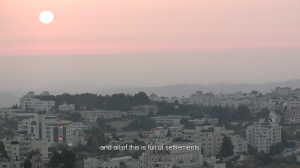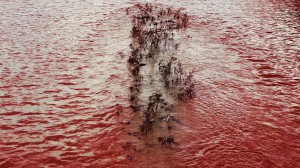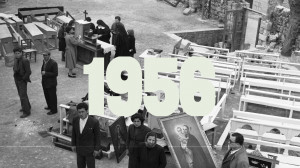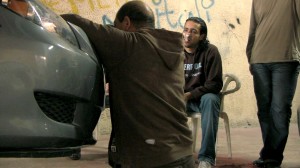An Evening of Shorts
Mondial 2010 | Directed by Roy Dib | 2014 | Lebanon
The Disquiet | Directed by Ali Cherri | 2013 | Lebanon
Blessed Blessed Oblivion | Directed by Jumana Manna | 2010 | Palestine
A series of subversive short films by artists as oppose to film directors punctuate the Arab British Centre’s Safar: The Festival of Popular Arab Cinema. Each one of these films examines the specificity of place respectively through unlikely prisms. In Mondial 2010 (2014) directed by Roy Dib, a Lebanese gay couple visits Ramallah; in The Disquiet (2013) by Ali Cherri, there are earthquakes and tremors in Lebanon, and Blessed Blessed Oblivion (2010) by Jumana Manna, the underbelly of a male subculture in East Jerusalem is exposed.
 Roy Dib (b. 1983) is a Lebanese artist who works with video, video installation and cinema. In a fascinating interview he gave for the Teddy Award at the 2014 Berlin Film Festival he talked about the inherent impossibilities of his short film Mondial 2010. Because his country has been at war with Israel since 1957, Lebanese nationals are not permitted to go to the West Bank.
Roy Dib (b. 1983) is a Lebanese artist who works with video, video installation and cinema. In a fascinating interview he gave for the Teddy Award at the 2014 Berlin Film Festival he talked about the inherent impossibilities of his short film Mondial 2010. Because his country has been at war with Israel since 1957, Lebanese nationals are not permitted to go to the West Bank.
Mondial 2010 has a sense of easiness about it, so that one would naturally imagine that Dib is in Ramallah filming its highways and the cityscape. In fact all the footage from Ramallah was taken by Palestinian filmmakers who met Dib every summer for three years in Ajloun in Jordan, during a kind of filmmakers’ summer school. Dib had asked them to film Palestine and its cities, making no comment or dialogue on the film itself, as if he were there working beside them. He took the five hours of rushes pertaining to Ramallah and wrote Mondial 2010 about a gay Lebanese couple on a road trip, visiting the city.
The film oscillates between two pillars of the forbidden. Even though only four hours separate Ramallah from Beirut by car, no Lebanese would be able to go there. That the couple in question are gay, which is still considered taboo in Lebanon and beyond, adds to the tension. Dib keeps the line between the two taut through the observations of the  character Ibrahim who films Ramallah from the car window. Or we hear him – but never see him or his boyfriend Youssef in the film – in a pub with Youssef’s friends discussing the 2010 World Cup, during a demonstration against Israel or standing on the roof of a high-rise that shows the encroaching West Bank settlements on the surrounding hillsides. Ibrahim becomes increasingly unsettled and finally demands that the two of them cut their trip short but not before he declares that ‘Ramallah is disappearing.’ It is a fantasy of an ideal world where the right to visit as well as the Palestinian right to return should be normal.
character Ibrahim who films Ramallah from the car window. Or we hear him – but never see him or his boyfriend Youssef in the film – in a pub with Youssef’s friends discussing the 2010 World Cup, during a demonstration against Israel or standing on the roof of a high-rise that shows the encroaching West Bank settlements on the surrounding hillsides. Ibrahim becomes increasingly unsettled and finally demands that the two of them cut their trip short but not before he declares that ‘Ramallah is disappearing.’ It is a fantasy of an ideal world where the right to visit as well as the Palestinian right to return should be normal.
Lebanon or rather the ground underneath is at the core of The Disquiet. Ali Cherri (b. 1976), an artist also from that country, retraces his childhood by mapping out Lebanon’s ecological disasters. The film is an allegory for the country’s inability to confront its past; truly the civil war and its aftermath have been the psychological fault-lines that have upset the psyche of the country.
 The Disquiet won the Muhr Arab Short Award for Best Director at the 2013 Dubai Film Festival. Cherri has worked in video, installation, performance, multimedia and print, and his art pieces and films have been shown around the world, from the Berlin Film Festival and Toronto Film Festival to VideoBrazil, Manifesta (Amsterdam) and Yalay Art Space in Hong Kong.
The Disquiet won the Muhr Arab Short Award for Best Director at the 2013 Dubai Film Festival. Cherri has worked in video, installation, performance, multimedia and print, and his art pieces and films have been shown around the world, from the Berlin Film Festival and Toronto Film Festival to VideoBrazil, Manifesta (Amsterdam) and Yalay Art Space in Hong Kong.
The film is disturbing. The country has been rocked by high Richter Scale earthquakes and tremors, which destroyed Tripoli and Beirut in the past. Yet nobody worries about this phenomenon. In one scene the camera travels into a beautiful forest and then stops to film a figure, perhaps the artist, walking through a  grove of trees. There seems to be something scary in the branches; on closer inspection they reveal themselves to be large taxidermy crows’ wings from another of Cherri’s art installations, The Sleep of Reason Brings Monsters, at the Galerie Janine Rubeiz in Beirut, from last year. It is in this dislocation between the absolutely frightening and the unspoken forces, felt but never commented on, which forms the physical/psychological landscape that Lebanon inhabits.
grove of trees. There seems to be something scary in the branches; on closer inspection they reveal themselves to be large taxidermy crows’ wings from another of Cherri’s art installations, The Sleep of Reason Brings Monsters, at the Galerie Janine Rubeiz in Beirut, from last year. It is in this dislocation between the absolutely frightening and the unspoken forces, felt but never commented on, which forms the physical/psychological landscape that Lebanon inhabits.
The third film of the evening is Blessed Blessed Oblivion by Jumana Manna. Safar’s artistic director Omar Kholeif called it ‘a male culture in Jerusalem, its appropriated language, dress in Jerusalem this strange hybrid territory, Palestine/Israel’. He continued, ‘How do you practice a sense of identity through appropriated images of masculinity? It is a film that opens up a different space.’
 Blessed Blessed Oblivion references Kenneth Anger’s Scorpio Rising (1963), a groundbreaking experimental film about biker subculture set to a pop music soundtrack. The young Palestinian men in Blessed are defined by the spaces and objects around them: the car wash and automotive mechanic shops, the cars they fix, the jeans they wear, what they do with their free time in the gym and barbershops and who they owe money to.
Blessed Blessed Oblivion references Kenneth Anger’s Scorpio Rising (1963), a groundbreaking experimental film about biker subculture set to a pop music soundtrack. The young Palestinian men in Blessed are defined by the spaces and objects around them: the car wash and automotive mechanic shops, the cars they fix, the jeans they wear, what they do with their free time in the gym and barbershops and who they owe money to.
Much has been made about Palestinian maleness but usually these stereotypes entwine terrorism and nationality. As rough as the men are in Manna’s film, they are witty and poetic in the obscene poems, martyr’s quotations and literary verses they recite. Their good times resonate in the strange and dark terrain around them. Her film is a reversal of the norm and all more unusual in the Middle East since Blessed is a woman’s exploration of maleness.
Manna (b. 1987) is a Palestinian American artist living in Berlin, who does film and sculpture. Last year, she was included  in the group exhibition Points of Departure at the ICA and participated in the Sharjah Biennale and Performa 13 Biennial, in New York. Her films have been included in London Palestine Film Festival, International Film Festival Rotterdam and the Toronto Palestinian Film Festival. Two years ago Manna received the Qattan Foundation’s Young Palestinian Artist Award.
in the group exhibition Points of Departure at the ICA and participated in the Sharjah Biennale and Performa 13 Biennial, in New York. Her films have been included in London Palestine Film Festival, International Film Festival Rotterdam and the Toronto Palestinian Film Festival. Two years ago Manna received the Qattan Foundation’s Young Palestinian Artist Award.
Conventional Egyptian and Lebanese movies in Safar have told London audiences stories from the Middle East that have passed the censors. These artists’ films reveal a view that is intimate and personal, unmediated by the state, and this gives them their edge. Mondial 2010, The Disquiet and Blessed Blessed Oblivion are usually screened in galleries and in the art film section of international film festivals. They are part of a growing art movement, one that is increasingly being recognised in the wider world, and this new wave gives rise to a different interpretation of what should also be considered popular Arab cinema.
– Malu Halasa
London-based journalist writer and editor Malu Halasa is our writer-in-residence. Keep your eyes peeled for her posts in the run-up and during the festival.
For more information and to book tickets, please click here.

